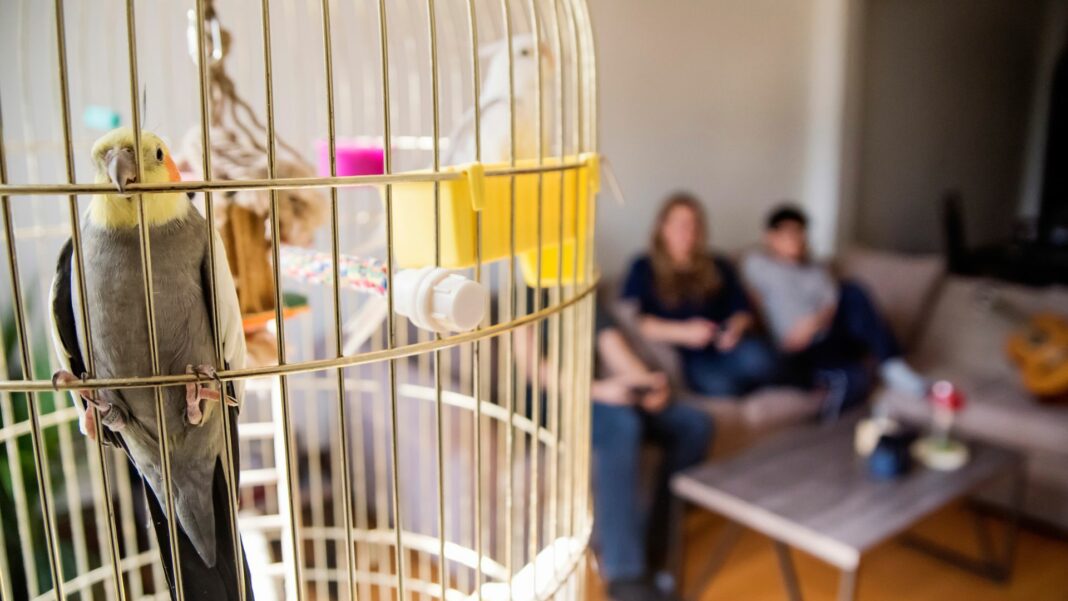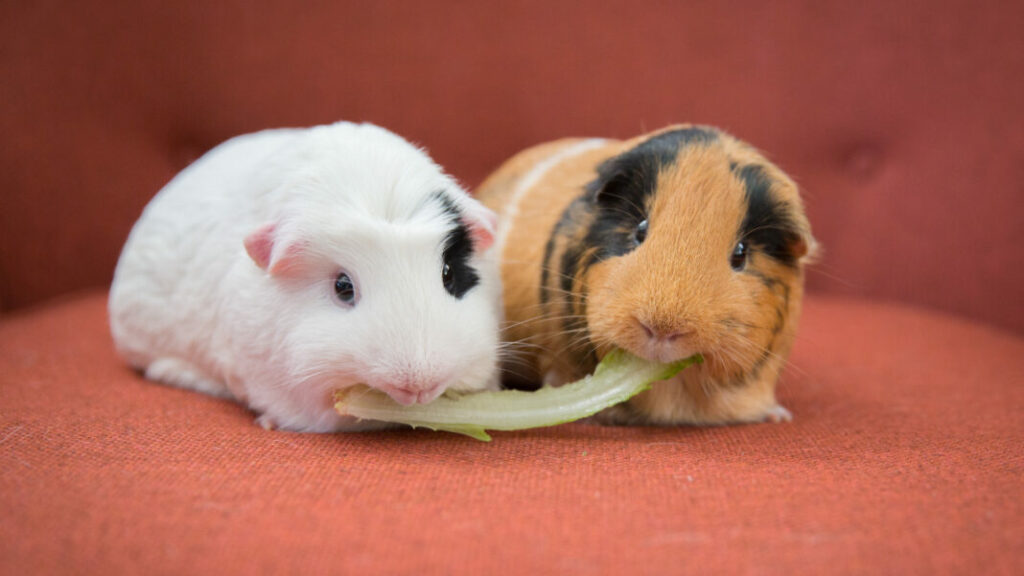
Whether you’re a seasoned renter or are new to apartment life, the dream of having a faithful pet by your side is within reach. But not all pets are equally suited for apartments. That’s why we’ve compiled a list of the 11 best pets for apartment dwellers, offering a blend of charm, companionship, and adaptability that’s tailor-made for renters. From pint-sized pups to low-maintenance reptiles, this guide will help you find the perfect pet to bring joy and comfort to your apartment living experience.
1. Dogs

Dogs are one of the most common pets renters get for their homes. While certain breeds can be high maintenance, there are some dog breeds that are exceptionally apartment-friendly. If looking to rent an apartment with a dog, you’ll want to consider the size of your rental unit. If you live in a studio or one-bedroom rental apartment, you may want a smaller dog than if you are renting larger apartment. The floor you’re living on can also impact your choice. Taking your dog out for walks and toilet breaks is easier when you’re on the ground floor. You should also pay attention to any breed restrictions noted in your lease agreement, and any requirements for renting with a dog, such as additional insurance requirements or security deposits.
Common dog breeds for apartments
- French Bulldog
- Havanese
- Pug
- Poodle
Pros of having a dog in an apartment:
- Companionship: Dogs are known for their loyalty and affection, providing emotional support and companionship, especially for those living alone.
- Exercise partner: Dogs encourage physical activity as you’ll need to take them for walks, which is beneficial for both their health and yours.
- Security: Dogs can serve as excellent watchdogs, alerting you to any unusual activity or potential threats.
- Routine: Owning a dog can help establish and maintain a daily routine, which can be beneficial for time management and discipline.
- Social interaction: Walking your dog or taking them to a nearby park can lead to increased social interactions with neighbors and other dog owners.
Cons of having a dog in an apartment:
- Space Limitations: Apartments often have limited space, which may not provide ample room for certain breeds, particularly larger ones.
- Noise: Barking can be disruptive to neighbors in close quarters, potentially causing tension and complaints.
- Exercise Needs: Dogs require regular exercise, and apartment living may not always offer the space for them to run and play freely.
- House Training: Potty training can be challenging in apartments, especially if you live on higher floors or lack immediate outdoor access.
- Additional Costs: Dogs come with expenses for food, veterinary care, grooming, and potentially pet insurance, which can strain your budget.
- Landlord Restrictions: Many apartments have restrictions on pet breeds, sizes, and even the number of pets allowed, limiting your options.
- Responsibility: Owning a dog is a long-term commitment that requires time, effort, and responsibility for their care, even in challenging situations.
2. Cats

Cats are very apartment-friendly pets as these animals are notoriously low maintenance, making them great for apartments and other rentals. Maintenance for a cat is significantly less than a dog, with most only need food, clean water, and a litter box to be happy. Cats are also notoriously quiet animals, so renters are less likely to worry about possible noise complaints. While cats can be known to scratch, keeping their nails trimmed and providing toys for mental stimulation can reduce the risk of them damaging your apartment or furnishings.
Common cat breeds for apartments
- American shorthair
- British shorthair
- Maine coon
- Ragdoll
Pros of having a cat in an apartment:
- Low space requirements: Cats are generally well-suited for apartment living because they don’t need a lot of space to roam.
- Low maintenance: Cats are relatively independent animals and are capable of grooming themselves. They also use litter boxes for their bathroom needs.
- Quiet companionship: Cats are generally quieter than dogs, making them less likely to disturb neighbors.
- Affectionate: Many cats are affectionate and provide companionship without the need for constant attention.
- Pest control: Cats have natural hunting instincts and can help keep your apartment free from pests like mice and insects.
Cons of having a cat in an apartment:
- Allergies: Cat allergies can be a concern for some people, leading to respiratory issues and discomfort.
- Litter box maintenance: You’ll need to regularly clean the litter box, and some people may find this task unpleasant.
- Scratching behavior: Cats have a natural instinct to scratch, which can lead to damage to furniture and belongings if not provided with appropriate scratching posts.
- Independence: While independence can be a pro, it can also mean that cats may not seek as much human interaction as dogs, and some cats may be aloof.
- Limited exercise: Cats can become sedentary if not encouraged to play and exercise, potentially leading to obesity and health issues.
- Potential allergen spread: Even if you’re not allergic to cats, their fur can carry allergens, which might affect guests who visit your apartment.
- Hair shedding: Many cats shed, and their fur can accumulate in your living space, requiring regular cleaning.
3. Birds

The vocal nature of birds can make them great company for apartment dwellers. Since you can keep them in their cage most of the time, they’re less likely to cause the potential damage that roaming pets can. Small birds are usually cheaper and easier to maintain than larger birds. Parakeets, budgies, canaries, cockatiels, and parrotlets are all small, relatively quiet birds with plenty of personality that love apartment life. Birds can be a greater long-term commitment, some living for 20-60 years, so keep that in mind before choosing a bird as a pet. Additionally, most birds do better with a friend, so you may want to consider adopting a pair.
Common bird breeds for apartments
- Parakeet
- Cockatiel
- Canarie
- Parrot
Pros of having a bird in an apartment:
- Space-efficient: Birds require less space than many other pets, making them suitable for apartments with limited room.
- Low noise level: Some bird species, like canaries or budgerigars, are known for their melodious, soothing songs, which can be enjoyable without being overly disruptive.
- Low allergen risk: Bird-related allergies are less common than allergies to mammals, such as cats or dogs.
- Entertaining: Birds can be entertaining and engaging with their playful behaviors and interactions.
- Longevity: Many bird species have relatively long lifespans, offering the potential for a lasting companionship.
- Minimal grooming: Birds groom themselves, so you won’t need to bathe or groom them regularly.
Cons of having a bird in an apartment:
- Noise: While some birds are quiet, others can be quite noisy, particularly during certain times of the day.
- Mess: Birds can be messy, scattering feathers, seeds, and droppings around their living area, requiring frequent cleaning.
- Social needs: Many birds are social creatures that need daily interaction and mental stimulation. Neglecting their social needs can lead to behavioral issues.
- Health concerns: Birds can transmit diseases to humans through their droppings or beaks, so proper hygiene is essential.
- Longevity: While a long lifespan is a pro, it also means a long-term commitment. Some bird species can live for decades.
- Flight hazards: In an apartment setting, it can be challenging to provide birds with enough space for flight and exercise.
- Legal restrictions: Some bird species are protected by laws and regulations, and it’s important to ensure you’re compliant with local laws when owning certain birds as pets.
- Expenses: Birds may require specialized cages, toys, and a varied diet, which can add up in terms of expenses.
4. Rabbits
Rabbits are friendly, sociable, and relatively small. They can also be litter trained and groom themselves, like cats. They can have an odor, so make sure you set aside time once a week to clean their enclosure. Many people also let their rabbits roam their apartments, but make sure you rabbit-proof your space first. Rabbits will chew on anything and everything to keep their teeth down. Cover or hide cords and consider removing rugs. Since these little furballs like to dig, don’t let them play unsupervised in carpeted rooms.
Common rabbit breeds for apartments
- Mini Rex
- Mini Lop
- American fuzzy lop
Pros of having a rabbit in an apartment:
- Size: Rabbits are generally small in size, making them well-suited for apartment living with limited space.
- Quiet: Rabbits are usually quiet animals and are less likely to disturb neighbors compared to some other pets.
- Cleanliness: They are naturally clean animals and can be litter trained, making cleanup relatively easy.
- Affectionate: Many rabbits are affectionate and enjoy human interaction, forming strong bonds with their owners.
- Low allergenicity: Rabbits are less likely to trigger allergies in humans compared to some other pets, such as cats or dogs.
Cons of having a rabbit in an apartment:
- Chewing behavior: Rabbits have a natural inclination to chew, which can lead to damage to furniture, cords, and belongings if not provided with proper outlets for this behavior.
- Social needs: Rabbits are social animals that require daily interaction, and loneliness can lead to behavioral issues.
- Exercise requirements: They need ample space to hop around and exercise, so it’s important to provide them with enough room to move freely.
- Lifespan: Rabbits can live for 10 years or more, which is a long-term commitment.
- Dietary needs: Rabbits require a specific diet with a focus on hay, fresh vegetables, and limited pellets. Maintaining a balanced diet can be a bit more complex.
- Litter box maintenance: While they can be litter trained, their litter boxes need regular cleaning.
- Health concerns: Like all pets, rabbits can have health issues that require veterinary care.
- Nail trimming: Regular nail trimming is necessary for rabbits to prevent overgrown nails.
- Nocturnal activity: Some rabbits can be more active at night, which might affect your sleep.
5. Ferrets
Ferrets would make a great addition to an apartment. They groom themselves, and you can train them to use a litter box, just like a cat. They’re playful and friendly. Since they sleep during the day, you don’t have to feel bad leaving them unattended when you go to work or run errands. Just block off small spaces where ferrets can hide and get trapped, like behind appliances. Also, keep your ferret in a shady part of the apartment, as these critters can get heat stress.
Common ferret breeds for apartments
Ferrets do not have specific breed types, but are rather categorized into varying colors. Common colors include Albino, Panda, Black Sable, and Siamese.
Pros of having ferrets in an apartment:
- Small size: Ferrets are relatively small and don’t require a lot of space, making them suitable for apartment living.
- Playful and energetic: Ferrets are known for their playful and curious nature, which can be entertaining to watch.
- Low noise level: They are generally not very noisy animals, making them less likely to disturb neighbors.
- Clean animals: Ferrets are naturally clean and can be litter trained, reducing the mess in your apartment.
- Affectionate: Many ferrets form strong bonds with their owners and enjoy human interaction.
- Social animals: Ferrets are social creatures and thrive on companionship, which can be fulfilling for owners who want an interactive pet.
Cons of having ferrets in an apartment:
- Odor: Ferrets have a distinct musky odor, which can be noticeable in a confined space. Regular cleaning is essential to manage this.
- Chewing and digging: They have a tendency to chew on things and dig in soft materials, which can lead to damage to furniture and carpets.
- Energetic play: Ferrets are highly energetic and need plenty of playtime and stimulation, which can be challenging in a limited apartment space.
- Escape artists: They are known to be skilled escape artists, so you need to ensure your apartment is secure to prevent them from getting into unsafe areas.
- Lifespan: Ferrets have a relatively short lifespan, typically around 6 to 10 years, which means you’ll face their end-of-life care relatively soon after bringing them home.
- Dietary needs: Ferrets have specific dietary requirements that may involve feeding them a mix of high-quality commercial ferret food and occasional fresh meat, which can be more involved than some other pets.
- Veterinary care: Finding a veterinarian experienced in treating ferrets may be more challenging in some areas.
- Noise when playing: While not noisy in terms of vocalizations, ferrets can be quite loud when playing, which might disturb neighbors in close quarters.
6. Hamsters
Hamsters are small, low-maintenance animals that make for great apartment pets. You don’t have to let them out of their cages if you provide a wheel for exercise. You can let them roam under close supervision or put them in a plastic ball to protect them from the environment and other pets. Their cages are relatively small, so they don’t take up a lot of space. Many apartments with no pets clauses allow hamsters, which can be a great option if you face restrictions. They’re also easily tolerated by most people with allergies.
Common hamster breeds for apartments
- Roborovski dwarf hamster
- Teddy bear hamster
- Chinese hamster
Pros of having a hamster in an apartment:
- Small size: Hamsters are tiny pets, making them suitable for apartments with limited space.
- Low noise level: They are generally quiet animals, which is ideal for apartment living where noise can be a concern.
- Low maintenance: Hamsters are relatively low-maintenance pets and do not require grooming or outdoor walks.
- Affordability: Hamsters are cost-effective pets in terms of initial setup and ongoing expenses.
- Entertaining: Watching hamsters in their cages can be quite entertaining, especially when they engage in activities like running on their wheels or burrowing.
Cons of having a hamster in an apartment:
- Limited interaction: Hamsters are primarily observed rather than interacted with, as they are not typically very affectionate or social animals.
- Nocturnal activity: Many hamsters are nocturnal, which means they are active at night, potentially disrupting your sleep.
- Short lifespan: Hamsters have a relatively short lifespan, usually around 2 to 3 years, which can lead to the emotional challenge of saying goodbye relatively quickly.
- Limited companionship: Unlike dogs or cats, hamsters do not provide the same level of companionship or emotional bonding.
- Escape artists: Hamsters are known to be escape artists, and ensuring their cage is secure can be crucial.
- Cage maintenance: Hamster cages need regular cleaning to prevent odors and maintain hygiene.
- Limited training: Hamsters cannot be trained to follow commands or perform tricks like some other pets.
7. Guinea pigs

Guinea pigs are another type of cute rodent that make good pets for apartments. They’re bigger than hamsters, so their cages are also larger. However, they’re incredibly low maintenance and easy to keep as pets. Like hamsters, guinea pigs roam outside their cages and play with humans. Just make sure to pay close attention and rodent-proof the space to prevent them from accidentally getting lost or trapped. Like birds, guinea pigs are often happiest with one or two friends to play with when you’re gone.
Common guinea pig breeds for apartments
- American guinea pig
- Abyssinian
- Teddy
Pros of having a guinea pig in an apartment:
- Small size: Guinea pigs are small and don’t require a lot of space, making them suitable for apartments with limited room.
- Quiet nature: They are generally quiet animals, making them less likely to disturb neighbors in close quarters.
- Sociable: Guinea pigs are social animals and often enjoy the companionship of other guinea pigs, which can be fulfilling for owners.
- Low allergenicity: Guinea pigs are less likely to trigger allergies in humans compared to some other pets, such as cats or dogs.
- Low grooming needs: Guinea pigs are relatively low-maintenance in terms of grooming, as they groom themselves.
- Vocal and expressive: Guinea pigs are known for their vocalizations and can provide unique and entertaining interactions with their owners.
Cons of having a guinea pig in an apartment:
- Cage size: While they don’t need a lot of space, guinea pigs do require a reasonably sized cage to ensure their well-being, and this takes up room in your apartment.
- Social needs: Guinea pigs are social animals, and it’s recommended to have at least two to prevent loneliness. This means additional space for cages and care for multiple animals.
- Dietary needs: They require a specific diet with fresh vegetables and high-quality guinea pig pellets, which may involve some additional preparation and expense.
- Litter box maintenance: You’ll need to maintain their cage and clean it regularly to prevent odors and ensure a healthy environment.
- Healthcare: Guinea pigs can have health issues that require veterinary care, and it’s essential to have access to a veterinarian experienced in treating these animals.
- Vulnerable to stress: Guinea pigs are sensitive to changes in their environment or routine and can become stressed easily.
- Nocturnal activity: They are crepuscular animals, meaning they are most active during dawn and dusk, which might affect your sleep if kept in your bedroom.
8. Chinchillas
Chinchillas are another species among the best pets for apartments. Their cages are larger than hamster and guinea pig enclosures as they like to climb around their environment. They stay pretty clean and don’t get very smelly. They’re also nearly silent so that you won’t get any complaints from the neighbors. They’re also nocturnal and sleep during the day, so you don’t have to feel guilty about leaving them home. Plus, they form strong bonds with their owners and can live upward of 15 to 20 years.
Pros of having a chinchilla in an apartment:
- Small size: Chinchillas are small, making them suitable for apartments with limited space.
- Quiet: They are generally quiet animals, which is ideal for apartment living where noise can be a concern.
- Low allergenicity: Chinchillas are less likely to trigger allergies in humans compared to some other pets, such as cats or dogs.
- Nocturnal activity: Chinchillas are crepuscular animals, meaning they are most active during dawn and dusk, which might align better with your schedule if you work during the day.
- Clean animals: Chinchillas are naturally clean animals and groom themselves regularly.
- Lifespan: Chinchillas have a relatively long lifespan, often reaching 10 to 20 years, offering lasting companionship.
Cons of having a chinchilla in an apartment:
- Space requirements: While they are small, chinchillas need a spacious cage to exercise and move around. Their cages can take up a significant amount of room in your apartment.
- Social needs: Chinchillas are social animals and may require companionship from another chinchilla to prevent loneliness.
- Special diet: They have specific dietary needs, including a diet rich in hay and limited treats. Providing the right diet can be more complex than for some other pets.
- Temperature sensitivity: Chinchillas are sensitive to temperature, particularly heat, and they require a cool living environment. Apartment temperatures must be carefully controlled.
- Chewing behavior: Chinchillas have strong teeth that continually grow, so they need safe items to chew on to keep their teeth healthy. This can lead to furniture and cord damage if not provided with suitable alternatives.
- Nocturnal activity: While their nocturnal nature can be a pro, it can also lead to nighttime activity that might affect your sleep if they are kept in your bedroom.
- Healthcare: Chinchillas can have health issues that require veterinary care, and it’s essential to have access to a veterinarian experienced in treating these animals.
Common chinchilla breeds for apartments
There are only two types of chinchilla breeds, short-tailed and long-tailed. Chinchilla’s do come in a variety of colors including grey, white, black, beige, and violet.
9. Fish
A small aquarium with one or more fish can be ideal for busy renters. They’re not as interactive as many pets, but they can help you feel calmer and less alone in your apartment. Tanks 5 gallons or less can fit in small spaces, but you may need a bigger tank if you have more than one species. Some species like tetras and guppies love living with other fish, while betas prefer to be alone. Most property owners and complexes will not apply a pet fee for fish, making them a great budget-friendly option.
Common saltwater fish
- Clownfish
- Hawkfish
- Yellow Tang
Common freshwater fish
- Beta
- Goldfish
- Neon tetra
Pros of having fish in an apartment:
- Low space requirements: Fish tanks come in various sizes, making them suitable for apartments with limited space.
- Quiet: Fish are silent pets, which is ideal for apartment living where noise can be a concern.
- Low allergenicity: Fish typically do not trigger allergies in humans, making them a good option for people with allergies.
- Aesthetic appeal: Fish tanks can be visually appealing and serve as a beautiful and calming addition to your apartment decor.
- Low maintenance: Compared to some other pets, fish require relatively low maintenance. Routine tasks include feeding, water changes, and tank cleaning.
- Educational: Fish tanks can be educational for children and adults alike, providing insights into aquatic ecosystems and fish behavior.
- Variety: There is a wide variety of fish species to choose from, allowing you to create a unique and diverse underwater environment.
Cons of having fish in an apartment:
- Initial setup costs: Setting up a fish tank can be expensive, with costs for the tank, equipment, decorations, and fish.
- Maintenance: While maintenance is generally low, it is consistent and essential. This includes regular water changes, filter cleaning, and water testing.
- Learning curve: Keeping fish healthy requires knowledge of water chemistry, filtration, and fish behavior. New aquarium owners may face a learning curve.
- Fish health: Fish can be susceptible to diseases, and treating them can be challenging, requiring access to a knowledgeable fish veterinarian.
- Limited interaction: Fish do not provide the same level of interactive companionship as mammals, such as dogs or cats.
- Water quality: Maintaining the quality of the aquarium water is crucial for fish health, which can be challenging for beginners.
- Tank size: The size of the tank can determine the types and number of fish you can keep, and larger tanks may take up more space in your apartment.
- Potential for leaks: Poorly maintained tanks or equipment malfunctions can lead to water leaks, potentially damaging your apartment.
10. Turtles
Turtles are ideal options for a long-lasting pet friend. Different species like the painted turtle and wood turtle each have a distinct look and personality. They also spend significant time in their tanks, and they can’t cause any damage. Keep in mind that tanks can start to take up more room as the turtle grows and matures. Turtles also require specialized care equipment, including lights, water filtration, and temperature management systems. While adding a turtle to your existing aquarium might seem easy, do your research as turtles will prey on some fish.
Common turtle breeds for apartments
- African Sideneck Turtle
- Central American Wood Turtle
- Reeve’s Turtle
Pros of having turtles in an apartment:
- Small size: Turtles are relatively small, making them suitable for apartments with limited space.
- Quiet: Turtles are generally quiet animals and do not produce loud noises, which is ideal for apartment living.
- Longevity: Many species of turtles have long lifespans, and they can provide companionship for a significant portion of your life.
- Low allergenicity: Turtles are less likely to trigger allergies in humans compared to some other pets, such as cats or dogs.
- Low maintenance: Turtles require relatively low maintenance, including feeding, tank cleaning, and water quality monitoring.
- Unique aesthetic: Turtles can be visually appealing and serve as unique additions to your apartment decor.
Cons of having turtles in an apartment:
- Initial setup costs: Setting up a suitable turtle enclosure can be expensive, with costs for the tank or enclosure, lighting, heating, filtration, and decorations.
- Tank size: Turtles need an appropriately sized tank or outdoor enclosure to thrive, and larger tanks can take up a significant amount of space in your apartment.
- Temperature and lighting needs: Many turtle species have specific temperature and lighting requirements that need to be carefully regulated.
- Water quality: Maintaining the quality of the water in a turtle tank or pond is crucial for their health, and this requires regular monitoring and water changes.
- Limited interaction: Turtles are not known for being particularly interactive or affectionate pets and may not provide the same level of companionship as mammals.
- Healthcare: Turtles can experience health issues that require veterinary care, and finding a reptile-experienced veterinarian may be necessary.
- Lifespan: While a long lifespan can be a pro, it also means a long-term commitment to care for your turtle.
- Potential for escape: Turtles can be surprisingly skilled at escaping their enclosures, and you need to ensure they are securely housed.
- Legal regulations: Some species of turtles are subject to legal regulations, and it’s essential to be aware of local laws regarding turtle ownership.
11. Other reptiles
Turtles aren’t the only cool reptiles that make good pets for apartments. Small lizards like geckos and bearded dragons and tiny snakes, like corn snakes and ball pythons, thrive in apartments. They’re silent, so the neighbors will never know they’re there, and they’re cheap to maintain. Some reptiles like snakes only need feeding once a week, so they’re perfect if you work long hours or spend a lot of time socializing. The reptile’s type and age determine the right tank size for your new pet. Make sure you account for specialty care equipment, like temperature management systems and heat lamps.
Pros of having reptiles in an apartment:
- Low space requirements: Many reptiles, especially smaller species, do not require a lot of space, making them suitable for apartments with limited room.
- Quiet: Reptiles are generally quiet animals and do not produce loud noises, which is ideal for apartment living.
- Low allergenicity: Reptiles are less likely to trigger allergies in humans compared to some other pets, such as cats or dogs.
- Longevity: Some reptile species have long lifespans, providing companionship for many years.
- Fascinating behavior: Observing reptiles can be intriguing as they often exhibit unique and fascinating behaviors.
- Educational: Reptiles can be educational pets, offering insights into reptile biology and natural behaviors.
- Low grooming: Reptiles do not require grooming like mammals, which can be a pro for some owners.
Cons of having reptiles in an apartment:
- Specialized habitat: Reptiles typically require specific enclosures, heating, lighting, and humidity control, which can be complex and expensive.
- Initial setup costs: The initial cost of setting up a reptile habitat, including the enclosure, heating, and lighting, can be high.
- Temperature and lighting needs: Reptiles often have precise temperature and lighting requirements that must be maintained consistently.
- Dietary variety: Reptiles may have specific dietary needs, which can include live insects or specialized reptile food, which may require extra effort and expense.
- Handling challenges: Many reptiles are not inherently social or interactive, and some can be stressed by handling, limiting opportunities for interaction.
- Potential for health issues: Reptiles can suffer from health problems, and finding a veterinarian experienced in reptile care may be challenging.
- Lifespan: Some reptiles have long lifespans, which means a long-term commitment to their care.
- Space: Even though some reptiles are small, their enclosures can take up space in your apartment.
- Escape risk: Reptiles, particularly snakes, can be skilled escape artists, and secure housing is crucial.
- Legal regulations: Some reptile species are subject to legal regulations, and it’s important to be aware of local laws regarding reptile ownership.
FAQ: The best pets for apartments
Many property managers charge pet owners an extra security deposit. They can keep some or all of this amount to fix any damage your pet creates. Supervising your pets at all times can help you receive your total security deposit when you move on.
Some apartments restrict renters from owning dogs considered aggressive or destructive. Some commonly restricted breeds include pit bulls, German shepherds, Doberman pinschers, mastiffs, and rottweilers. Private property owners often have more relaxed pet policies than rental companies, so they can be a great option if you own one of these frequently banned breeds.
Unsuitable pets for apartments require a lot of space or don’t suit communal living. Pets that require a lot of space may encroach on your living quarters. Large dogs that need a lot of room to run around may also become destructive cooped up in your apartment. A noisy pet, such as a macaw or barking dog, may disturb your neighbors. A dog that isn’t friendly may also frighten residents when you take the dog out for walks.
Remember, not every property owner or apartment complex allows pets. Filter your search results to only show properties welcoming your furry, feathered, or scaly friend. Review your lease and ask the property manager about the pet policy, including the types of pets they allow, size or breed restrictions, and applicable pet fees. This information can help you determine the best pets for apartments, especially if you plan to rent for a while or move to another rental.



